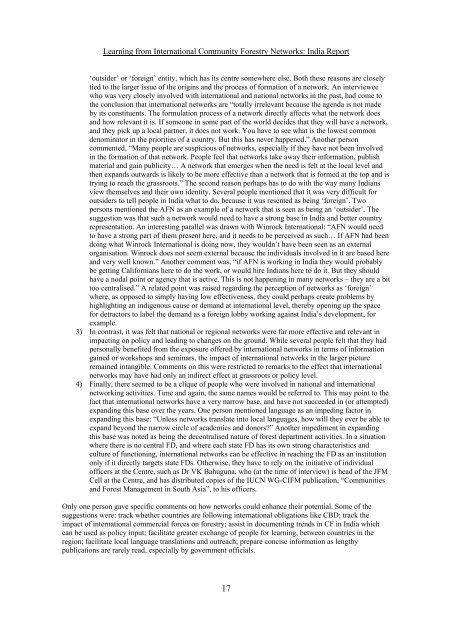Snapshots of International Community Forestry Networks: Country ...
Snapshots of International Community Forestry Networks: Country ...
Snapshots of International Community Forestry Networks: Country ...
Create successful ePaper yourself
Turn your PDF publications into a flip-book with our unique Google optimized e-Paper software.
Learning from <strong>International</strong> <strong>Community</strong> <strong>Forestry</strong> <strong>Networks</strong>: India Report<br />
‘outsider’ or ‘foreign’ entity, which has its centre somewhere else. Both these reasons are closely<br />
tied to the larger issue <strong>of</strong> the origins and the process <strong>of</strong> formation <strong>of</strong> a network. An interviewee<br />
who was very closely involved with international and national networks in the past, had come to<br />
the conclusion that international networks are “totally irrelevant because the agenda is not made<br />
by its constituents. The formulation process <strong>of</strong> a network directly affects what the network does<br />
and how relevant it is. If someone in some part <strong>of</strong> the world decides that they will have a network,<br />
and they pick up a local partner, it does not work. You have to see what is the lowest common<br />
denominator in the priorities <strong>of</strong> a country. But this has never happened.” Another person<br />
commented, “Many people are suspicious <strong>of</strong> networks, especially if they have not been involved<br />
in the formation <strong>of</strong> that network. People feel that networks take away their information, publish<br />
material and gain publicity… A network that emerges when the need is felt at the local level and<br />
then expands outwards is likely to be more effective than a network that is formed at the top and is<br />
trying to reach the grassroots.” The second reason perhaps has to do with the way many Indians<br />
view themselves and their own identity. Several people mentioned that it was very difficult for<br />
outsiders to tell people in India what to do, because it was resented as being ‘foreign’. Two<br />
persons mentioned the AFN as an example <strong>of</strong> a network that is seen as being an ‘outsider’. The<br />
suggestion was that such a network would need to have a strong base in India and better country<br />
representation. An interesting parallel was drawn with Winrock <strong>International</strong>: “AFN would need<br />
to have a strong part <strong>of</strong> them present here, and it needs to be perceived as such… If AFN had been<br />
doing what Winrock <strong>International</strong> is doing now, they wouldn’t have been seen as an external<br />
organisation. Winrock does not seem external because the individuals involved in it are based here<br />
and very well known.” Another comment was, “if AFN is working in India they would probably<br />
be getting Californians here to do the work, or would hire Indians here to do it. But they should<br />
have a nodal point or agency that is active. This is not happening in many networks – they are a bit<br />
too centralised.” A related point was raised regarding the perception <strong>of</strong> networks as ‘foreign’<br />
where, as opposed to simply having low effectiveness, they could perhaps create problems by<br />
highlighting an indigenous cause or demand at international level, thereby opening up the space<br />
for detractors to label the demand as a foreign lobby working against India’s development, for<br />
example.<br />
3) In contrast, it was felt that national or regional networks were far more effective and relevant in<br />
impacting on policy and leading to changes on the ground. While several people felt that they had<br />
personally benefited from the exposure <strong>of</strong>fered by international networks in terms <strong>of</strong> information<br />
gained or workshops and seminars, the impact <strong>of</strong> international networks in the larger picture<br />
remained intangible. Comments on this were restricted to remarks to the effect that international<br />
networks may have had only an indirect effect at grassroots or policy level.<br />
4) Finally, there seemed to be a clique <strong>of</strong> people who were involved in national and international<br />
networking activities. Time and again, the same names would be referred to. This may point to the<br />
fact that international networks have a very narrow base, and have not succeeded in (or attempted)<br />
expanding this base over the years. One person mentioned language as an impeding factor in<br />
expanding this base: “Unless networks translate into local languages, how will they ever be able to<br />
expand beyond the narrow circle <strong>of</strong> academics and donors?” Another impediment in expanding<br />
this base was noted as being the decentralised nature <strong>of</strong> forest department activities. In a situation<br />
where there is no central FD, and where each state FD has its own strong characteristics and<br />
culture <strong>of</strong> functioning, international networks can be effective in reaching the FD as an institution<br />
only if it directly targets state FDs. Otherwise, they have to rely on the initiative <strong>of</strong> individual<br />
<strong>of</strong>ficers at the Centre, such as Dr VK Bahuguna, who (at the time <strong>of</strong> interview) is head <strong>of</strong> the JFM<br />
Cell at the Centre, and has distributed copies <strong>of</strong> the IUCN WG-CIFM publication, “Communities<br />
and Forest Management in South Asia”, to his <strong>of</strong>ficers.<br />
Only one person gave specific comments on how networks could enhance their potential. Some <strong>of</strong> the<br />
suggestions were: track whether countries are following international obligations like CBD; track the<br />
impact <strong>of</strong> international commercial forces on forestry; assist in documenting trends in CF in India which<br />
can be used as policy input; facilitate greater exchange <strong>of</strong> people for learning, between countries in the<br />
region; facilitate local language translations and outreach; prepare concise information as lengthy<br />
publications are rarely read, especially by government <strong>of</strong>ficials.<br />
17

















![CynefinFramework final [Read-Only]](https://img.yumpu.com/19017304/1/190x135/cynefinframework-final-read-only.jpg?quality=85)